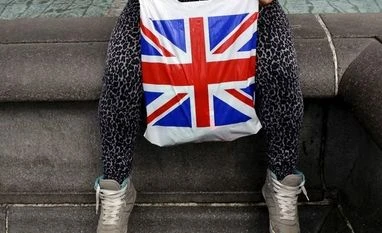British retail sales suffered their sharpest monthly fall in six months in June, but stores said bad weather rather than Brexit was to blame, leaving open the question of how big a hit the vote to leave the European Union will deal to the economy.
Retail sales volumes in the five weeks to July 2 dropped by 0.9%, their largest fall this year, and clothing stores reported the sharpest annual drop in quarterly sales in 25 years, according to official figures released on Thursday.
Sterling fell against the dollar after the data, which came in below economists' expectations, as analysts said a Brexit effect could not be ruled out and that worse may be to come.
But the Office for National Statistics said retailers did not attribute the fall to the result of the June 23 referendum.
"Changeable weather" was the main thing dragging down clothes sales, while department stores got a boost from the Euro 2016 soccer contest and Queen Elizabeth's 90th birthday celebrations, it said.
Measures of consumer sentiment have shown a darker mood since the EU vote, but this has not translated into an immediate fall in households' spending in data from the ONS, British Retail Consortium and the Bank of England.
Also Read
"The volume of retail sales will only really start to be hit more markedly further down the line once firms cut back on hiring ... and the fall in sterling is passed through into retail prices," UniCredit economist Daniel Vernazza said.
A Mintel market research report showed that while 39%of British consumers thought leaving the EU would hurt the economy, 25% expected to see gains.
BOE DILEMMA
Limited evidence on the impact of the Brexit vote may put the BoE in a quandary next month when it decides whether to cut interest rates, and what if any additional stimulus the economy needs to deal with what it expects will be a material economic slowdown.
While sterling suffered it biggest two-day fall on record and some corners of the financial markets - such as commercial property funds - have come under severe stress, policymakers say the situation does not remind them of the 2008 financial crisis.
BoE policymaker Kristin Forbes said in a newspaper column on Thursday, before the data, that it would be better to wait and see the impact of the Brexit vote on Britain's economy before cutting rates, a view shared by her colleague Martin Weale.
They stand at odds with the central bank's chief economist, Andy Haldane, who said it was better to use "a sledgehammer to crack a nut", even if the effect of leaving the EU on investment and hiring turned out to be modest.
Last week the BoE surprised markets by not cutting rates, but minutes of that decision showed most policymakers expected to approve a package of stimulus measures in August.
Next week will see the release of economic growth figures for the three months to June, which the central bank expects to show growth roughly in line with Britain's long-run average.
Retail sales over that period expanded at their fastest quarterly pace since late 2014.
In June, public borrowing dropped to its lowest for the month since 2007, down 22% on the year to 7.8 billion pounds ($10.3 billion), the ONS said on Thursday.
But this will be scant comfort to former finance minister George Osborne, who lost his job after the EU vote, and the government's budget watchdog said there were some hints of weakening tax revenue in the run-up to the vote.
New finance minister Philip Hammond told parliament on Tuesday that the expected slowdown in the economy meant Britain needed a new framework to tackle its budget deficit, which he said was still "very large".
The deficit was 4.0% of gross domestic product in the 12 months to March, down from over 10%in 2010 but still among the highest for a developed nation.
)